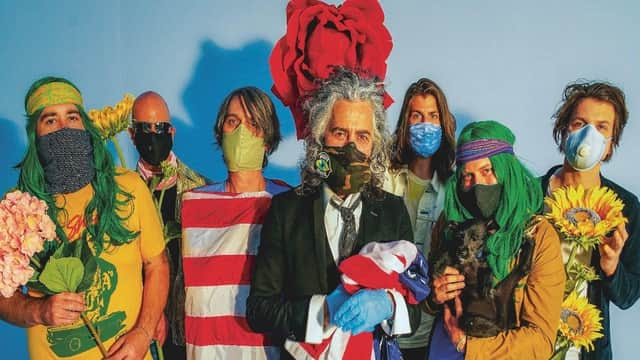Album reviews: The Flaming Lips | Bill Callahan | Suzanne Butler


The Flaming Lips: American Head (Bella Union) ****
Bill Callahan: Gold Record (Drag City) ****
Suzanne Butler: Be Your Own Man (Limpet Records) ****
Earlier this summer, The Flaming Lips performed “at home” on The Late Show with Stephen Colbert with band and audience members encased in plastic bubbles – not so much ahead of the game with their vision of socially distanced gigging as in a parallel imaginative universe.
This is a band who have always operated in their own entertaining and eccentric bubble, in recent years producing unlikely collaborations with Miley Cyrus, Kesha and Deap Vally and acid-fried concept albums about giant regal babies narrated by Mick Jones of The Clash.
Advertisement
Hide AdAdvertisement
Hide AdIn comparison, the conceptual starting point for their latest album, American Head, is quite classic, almost conventional, inspired as it was by news of the death of Tom Petty. From here, frontman Wayne Coyne and his chief co-conspirator Steven Drozd imagined an early 70s pitstop by the nascent Heartbreakers in the Lips’ territory of Oklahoma, which got them musing on what it means to be an American band.
Of course, this is The Flaming Lips’ singular vision of what that might involve, so they translate the Petty hallmarks of a freewheeling, earthy, rocking band of brothers as a cosmic trip characterised by reedy, beseeching vocals, burnished guitar, twinkling keyboards, epic drum fills and 70s symphonic pop swell, describing what sounds like some kind of acid nightmare on opening track Will You Return.
Running theme established, they explore US teen rites of passage on At the Movies on Quaaludes and Mother I’ve Taken LSD. The former captures a sense of youthful invincibility, freedom and being absolutely smashed; the latter is the painful comedown, while You n Me Selling Weed imagines older siblings selling drugs to the visiting rock stars.
Kacey Musgraves guests on floaty psych pop numbers Flowers of Neptune 6 and God and the Policeman but there is great sadness to navigate in the celestial requiem Mother Please Don’t Be Sad – a murdered son’s plea from beyond the grave – and the darker space jazz odyssey When We Die When We’re High before reaching closing epiphany My Religion Is You.
As The Flaming Lips stake their claim as a great American band, so Bill Callahan continues his prolific, yet unhurried journey as a great American songwriter – by referencing other great American (and Canadian) songwriters.
Gold Record opens with a nod to another baritone storyteller: “hello, I’m Johnny Cash.” Pigeons is the sort of story Cash would tell, about an old chauffeur who’s seen it all and has some wisdom to impart, if only he is asked. Callahan then signs off this junkyard waltz with the words “sincerely L Cohen”. The bare bones blues of Protest Song is delivered with a Cohenesque purr and he pays droll tribute to Ry Cooder on the song of the same name.
With a new track previewed every week in the run-up to release, Gold Record already feels like an old friend.The newly sociable Callahan offers a song about neighbourliness taken a bit too far (The Mackenzies), while the simple domesticity of cosmic country number Breakfast carries a slight sting in the tail (“I drink so that we don’t fight”), all dispatched with Callahan’s conversational tones right there in your ear.
Advertisement
Hide AdAdvertisement
Hide AdEast Lothian-based Suzanne Butler brings considerable experience as a session musician to bear on her polished debut album, Be Your Own Man. I Was The First is an impressive opener with soul and blues inflections to its timeless AOR, Butler entirely in command of her rich, rock-tinged vocal and a bonus sultry saxophone break from Phil Bancroft.
The slick, swaggering Scot pop of Too Much Company contrasts with the yearning balladry of Seventeen Coats, the pastoral flute and lyrical violin of Grey Summer Garden and the melancholy rapture of Judee Sill’s The Kiss, but all showcase a musician who knows how to be her own woman.
CLASSICAL
Strauss: Tod und Verklärung | Don Juan | Sechs Lieder Op 68 (Linn) ****
As principal conductor of the Scottish Chamber Orchestra, Robin Ticciati’s opportunities to explore the wilder opulence of Richard Strauss’ music were limited by the orchestras size and resources. In situ with Glyndebourne Opera such repertory inclinations have borne fruit, but it is in this new all-Strauss recording with the Deutsches Symphonie-Orchester Berlin that the floodgates appear to have fully opened. The early tone poem Don Juan is a perfect starting point. Ticciati’s boyish enthusiasm feeds every impetuous moment, so rampant with adrenalin that when the brakes go on, as Strauss insists with unpredictable frequency, it’s like hitting the corners in a white knuckle ride. There’s respite in the sumptuous Sechs Lieder, Op 68, sung with heartwarming intimacy by Scots-trained soprano Louise Alder. Then it’s back to orchestral power play in Tod und Verklärung, and a stirring tour de force from Ticciati. Ken Walton
FOLK
Rura: Live at the Old Fruitmarket (Rura Music) ****Rura don’t really need it, but the string section (including Seonaid Aitken and Megan Henderson) that drifts in behind this album’s opening reel, Catriona’s, certainly brings a near orchestral feel to this powerful live performance from the Glasgow-based quartet as they celebrate their tenth anniversary at Celtic Connections. The fiddle and pipes/whistle pairing of Jack Smedley and Steven Blake, propelled by guitarist Adam Brown and bodhran and flute player David Foley, generate an energy that crackles through The Dark Reel and puts a hypnotic spin on the Day One set. They’re bolstered by electric guitarist Chris Waite and pipers Ali Hutton and Findlay MacDonald, while snatches of recorded interviews with grandparents lace In Praise of Home and I’ll Never Forget. Former member Adam Holmes joins them for two songs, particularly a full-voiced delivery of Mary, in what comes over as a jubilant homecoming indeed. Jim Gilchrist